模块五第一单元测试题及答案
- 格式:doc
- 大小:75.00 KB
- 文档页数:8
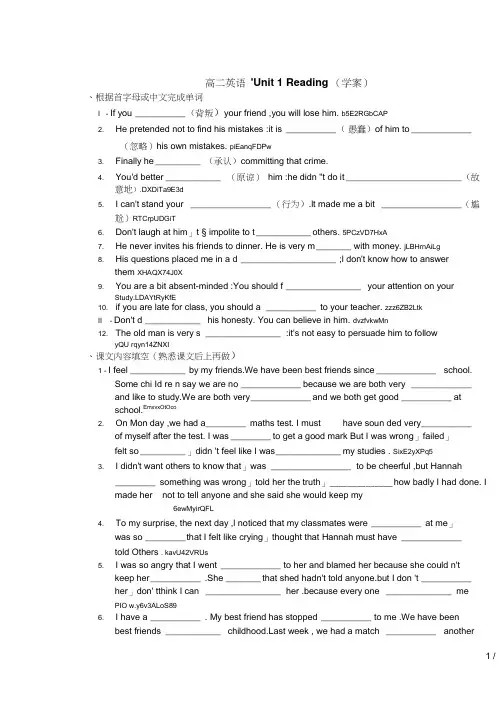
高二英语'Unit 1 Reading (学案)、根据首字母或中文完成单词I - If you __________ (背叛)your friend ,you will lose him. b5E2RGbCAP2. He pretended not to find his mistakes :it is __________ (愚蠢)of him to ____________(忽略)his own mistakes. piEanqFDPw3. Finally he _________ (承认)committing that crime.4. You'd better ___________ (原谅)him :he didn "t do it _______________________ (故意地).DXDiTa9E3d5. I can't stand your ________________ (行为).lt made me a bit ________________ (尴尬)RTCrpUDGiT6. Don't laugh at him」t § impolite to t ___________ others. 5PCzVD7HxA7. He never invites his friends to dinner. He is very m _______ with money. jLBHrnAiLg8. His questions placed me in a d ___________________ ;l don't know how to answerthem XHAQX74J0X9. You are a bit absent-minded :You should f _______________ your attention on yourStudy.LDAYtRyKfE10. if you are late for class, you should a __________ to your teacher. zzz6ZB2LtkII - Don't d ___________ his honesty. You can believe in him. dvzfvkwMn12. The old man is very s _______________ :it's not easy to persuade him to followyQU rqyn14ZNXI、课文内容填空(熟悉课文后上再做)1 - I feel ___________ by my friends.We have been best friends since ____________ school.Some chi Id re n say we are no ____________ because we are both very ____________and like to study.We are both very ____________ and we both get good __________ atschool.EmxvxOtOco2. On Mon day ,we had a________ maths test. I must have soun ded very __________of myself after the test. I was ________ to get a good mark But I was wrong」failed」felt so _________ 」didn 't feel like I was _____________ my studies . SixE2yXPq53. I didn't want others to know that」was ________________ to be cheerful ,but Hannah________ something was wrong」told her the truth」______________ how badly I had done. I made her not to tell anyone and she said she would keep my6ewMyirQFL4. To my surprise, the next day ,l noticed that my classmates were __________ at me」was so ________ t hat I felt like crying」thought that Hannah must have ____________told Others . kavU42VRUs5. I was so angry that I went ____________ to her and blamed her because she could n'tkeep her __________ .She _______ that shed hadn't told anyone.but I don 't __________her」don' tthink I can _______________ her .because every one _____________ mePIO w.y6v3ALoS896. I have a __________ . My best friend has stopped __________ to me .We have beenbest friends ___________ st week , we had a match __________ another1 /school.The other team was _________ and we really had to __________ . Matthew wasplaying really badly.He seemed _______________ and as a ______________ of his__________ playing,we lost the game. M2ub6vSTnP7 I thought he was not trying hard eno ugh and he got very ___________ with me .He said itwasn't his __________ and I should n't _____________ at him. Then we both startedshouting at each other and it __________ into a horrible _______________ .He kept onsayi ng really __________ things to hurt me」feel really _____________ because I saidsome really _____________ things too,but I can't ______________ seeing our teamlose .OYujCfmllCw8. These days he has been very _________ and looks sad. He is usually ________ andoutgoing .Yesterday ,1 saw him talking to another boy ,and I can f help __________ if hewants the boy to be his friend _________ of me . What should I do ? euts8ZQVRd三、词组选择(注意形式)get along (on) keep one'sword forgive • •- for in trouble as a result (of)blame …for in public be proud of be sure to do feel like be determi ned to do tur n into can't help doing sth in stead of can't stand doing sQsAEJkW5TI- You can't shout ____________ .It will bother others. GMsiasNXkA2. If you work hard ,you ______________ r ealize your dream. TirRGchYzg3. Yesterday it rained very heavily. __________________________ , our journey wasdelayed.7EqZcWLZNX4. Liu Xiang is a great athlete and has won a lot of gold medals. The Chinese people himlzq7IGfO2E5. Now he is very busy If it is convenient ,would you like to go __________________________him ?zvpgeqJ1hk6. Why didn't you come yesterday ? Once you promise others ,you should.NrpoJac3v17 People in that area often have words with each other. Sometimes the quarrelsfights. 1nowfTG4KI8. Are you thirsty ? Would you _____________ a cup of tea? fjnFLDaSZo9. After many years of hard work ,he _______________ w ell with his job. tfnNhnE6e510. Don" t _________ him _______ h is mistake .After all ,he is a small boy. HbmVN777sLII- After the quarrel ,he asked her to _________ him ___________ h is rudeness. V7i4jRB8Hs12. Don't hesitate to come to me .Once you are ________ , I will help you . 83icPA59W913. He has n't arrived」_________________ (wait) for him any Ion ger. mZkkikzaaP14. The movie was very interesting .We ___________________________ (laugh) during theITIOVie. AVktR43bpw15. He has a strong will. Once he gets down to his work, he ___________________ stick tojf ORjBnOwcEd四、句型转换1- When we were in primary school ,we were best friends ;now we are still bestfriends. 2MiJT y°dTTWe__________________ b est friends ____________________ school. giiSpiue7A2. He is very happy」guess he has passed the exam.He is very happy . He must ___________________ the exam. uEhouiYfmh3. It is a shame that she cheated in the competition. She regretted that. iAg9qLsgBXShe ___________________ that she cheated in the competition. wwghWvVhPE4. He was determined that he would face all difficulties with courage. asfpsfpi4kHe was ____________________________ all difficulties with courage. ooeyYZTjji5. He was abse nt from the meeti ng . Un expectedly ,he was fired. BkeGuinkxiHe lost his job _____________________________________ his ___________ from themeeting .PgdOOsRiMo6. He pretended to be ill and didn't attend the meeting .Later he told me the truth. 3cdXwckmi5He ___________ ______________ to be ill and wasn't present __________________ the meeting. h8c52WOngM7. A good Diet is very important for a person .Exercise is important ,too. v4bdyGiousA good diet is very important and _________________ exercise. J0bm4qMpj98」doubt his honesty.I doubt ________ h e is ___________ .I have some doubt ______ h e is ____________ .五、句子翻译1. 自从毕业以来,他一直在那家公司里工作。
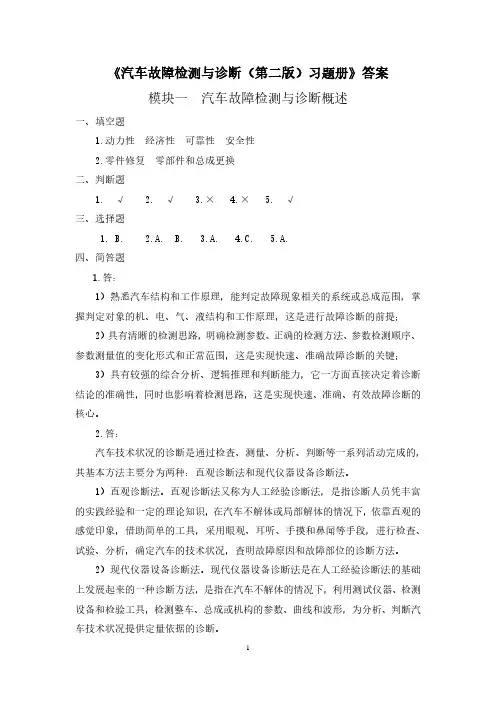

学习模块一:汽车发动机电控系统的认知任务一发动机电控系统的认知课时:学时班级:组别:姓名:掌握程度:□优□良□及格□不及格二、原理与应用1、发动机电控系统控制器图1-1 发动机电控系统组成(1)发动机电控系统由:传感器、控制单元、执行器三部分组成(2)请将下图按空格填写完成图1-2发动机电控系统原理图② 传感器:是一种信号输入装置,通俗的说就是“从被测物体中提取有用的信息”。
②控制单元:简称电脑,是电控系统的“核心部件”,英文缩写是ECU。
其作用是存储车辆特征参数和运算中所需的有关数据信息给各传感器提供参考电压;接收传感器或其他装置输入的电信号,并对所接收的信号进行储存、计算和分析处理;根据计算和分析的结果向执行器发出指令,或根据指学习模块一:汽车发动机电控系统的认知任务二汽车发动机电控系统认知实训四、操作流程四、操作流程(一)操作步骤步骤一:传感器查找注①□□图1-11空气流量计.□□图1-12进气压力传感器□□图1-13进气温度传感器□□图1-14节气门位置传感器□□图1-15冷却液温度传感器(1)安装位置:节气门与空滤之间。
(2)作用:检测进入气缸的进气量,ECU根据此信号确定基本喷油量。
(1)安装位置:①机械式(分开)在节气门拉线对面;②电子式(电子节气门总成里)。
(2)作用:反映节气门开度(负荷)的大小,判定发动机各种工况;反映节气门变化快慢(加速、减速),实现加速增浓和减速减油或断油控制。
(1)安装位置:①独立装于进气道;②与空气流量传感器、进气压力传感器为一体。
(2)作用:检测进气温度,修正喷油脉宽和点火正时。
(1)安装位置:节气门后方的进气歧管上。
(2)作用:检测节气门后方进气管内的进气压力,计算进气量,决定基本喷油量。
四、操作流程□□图1-16燃油位置传感器□□图1-17曲轴位置传感器□□图1-18凸轮轴位置传感器□□图1-19氧传感器□□图1-20爆震传感器(1)安装位置:装于缸体、缸盖的水套或节温器旁边、出水三通管上。
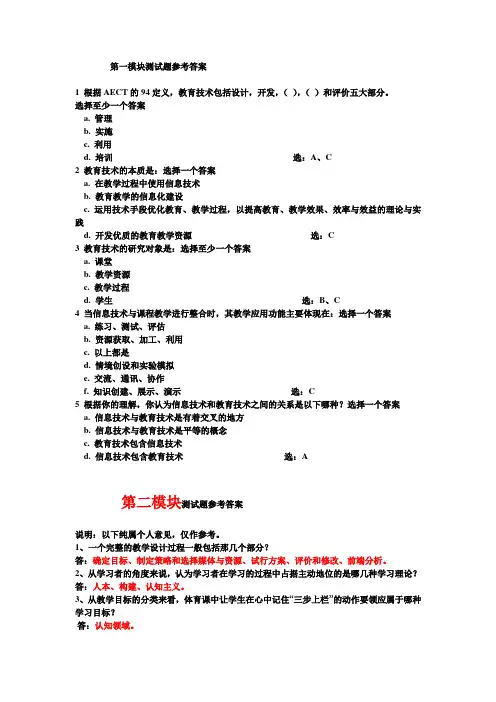
第一模块测试题参考答案1 根据AECT的94定义,教育技术包括设计,开发,(),()和评价五大部分。
选择至少一个答案a. 管理b. 实施c. 利用d. 培训选:A、C2 教育技术的本质是:选择一个答案a. 在教学过程中使用信息技术b. 教育教学的信息化建设c. 运用技术手段优化教育、教学过程,以提高教育、教学效果、效率与效益的理论与实践d. 开发优质的教育教学资源选:C3 教育技术的研究对象是:选择至少一个答案a. 课堂b. 教学资源c. 教学过程d. 学生选:B、C4 当信息技术与课程教学进行整合时,其教学应用功能主要体现在:选择一个答案a. 练习、测试、评估b. 资源获取、加工、利用c. 以上都是d. 情境创设和实验模拟e. 交流、通讯、协作f. 知识创建、展示、演示选:C5 根据你的理解,你认为信息技术和教育技术之间的关系是以下哪种?选择一个答案a. 信息技术与教育技术是有着交叉的地方b. 信息技术与教育技术是平等的概念c. 教育技术包含信息技术d. 信息技术包含教育技术选:A第二模块测试题参考答案说明:以下纯属个人意见,仅作参考。
1、一个完整的教学设计过程一般包括那几个部分?答:确定目标、制定策略和选择媒体与资源、试行方案、评价和修改、前端分析。
2、从学习者的角度来说,认为学习者在学习的过程中占据主动地位的是哪几种学习理论?答:人本、构建、认知主义。
3、从教学目标的分类来看,体育课中让学生在心中记住“三步上栏”的动作要领应属于哪种学习目标?答:认知领域。
4、信奉教育万能论和环境决定论的学习理论是行为主义4、信奉教育万能论和环境决定论的学习理论是下面的哪种?答:行为主义。
5、如果您所教的是小学5 、6 年级的学生,以下可能不属于他们特征的是:答:学生能够对社会存在、公正、真理及道德等抽象的社会问题进行比较准确的分析。
6、在对学习者特征进行分析的时候,我们一般分析那几方面的特征?答:入门能力、学习风格、一般特征。
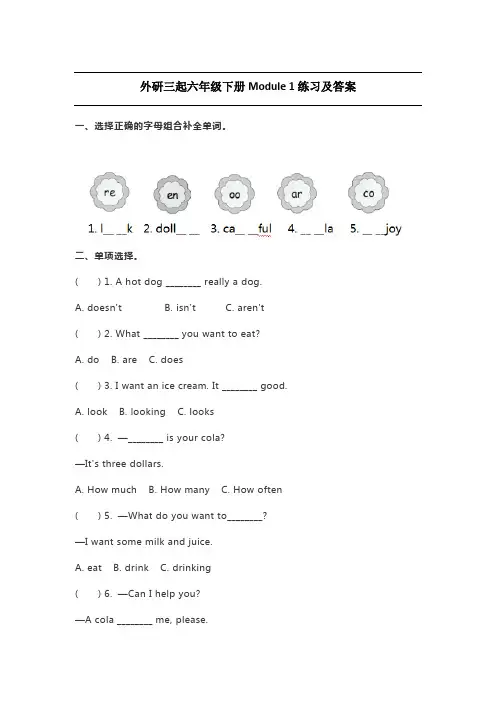
外研三起六年级下册Module 1练习及答案一、选择正确的字母组合补全单词。
二、单项选择。
( ) 1. A hot dog ________ really a dog.A. doesn'tB. isn'tC. aren't( ) 2. What ________ you want to eat?A. doB. areC. does( ) 3. I want an ice cream. It ________ good.A. lookB. lookingC. looks( ) 4. —________ is your cola?—It's three dollars.A. How muchB. How manyC. How often( ) 5. —What do you want to________?—I want some milk and juice.A. eatB. drinkC. drinking( ) 6. —Can I help you?—A cola ________ me, please.A. atB. inC. for三、选出与图意相符的对话,将字母标号填入括号中。
A. —What do you want to eat?—I want some chicken,please.B. —And to drink? —A cola,please.C. —How much is it?—It's three dollars and seventy-five cents.D. —What does Tom want?—A hot dog and a glass of orange juice.E. —Do you want some milk?—Yes,please.四、用所给词的适当形式填空。
1. Some orange juice for ________(I),please.2. I want__________ (buy)a book.3. Does Lily________ (want)a hamburger?4. Daming wants three________ (cola).5. Here________ (come) our school bus.五、根据图示,仿照例子写对话。
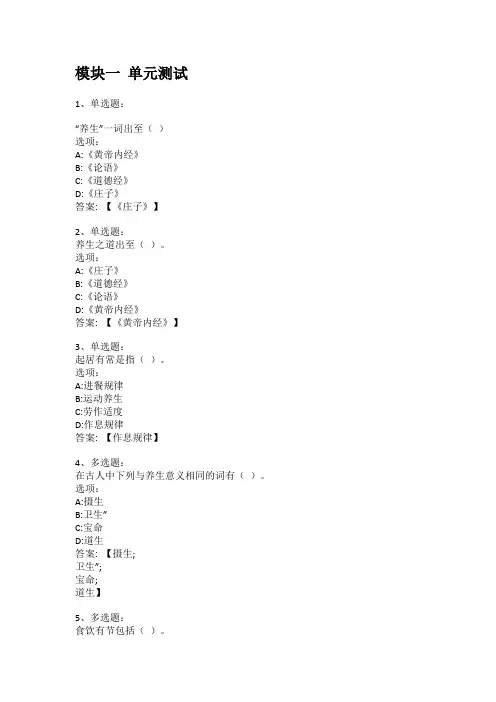
模块一单元测试1、单选题:“养生”一词出至()选项:A:《黄帝内经》B:《论语》C:《道德经》D:《庄子》答案: 【《庄子》】2、单选题:养生之道出至()。
选项:A:《庄子》B:《道德经》C:《论语》D:《黄帝内经》答案: 【《黄帝内经》】3、单选题:起居有常是指()。
选项:A:进餐规律B:运动养生C:劳作适度D:作息规律答案: 【作息规律】4、多选题:在古人中下列与养生意义相同的词有()。
选项:A:摄生B:卫生”C:宝命D:道生答案: 【摄生;卫生”;宝命;道生】5、多选题:食饮有节包括()。
A:饮食营养B:饮食安全C:饮食卫生D:饮食规律答案: 【饮食营养;饮食卫生;饮食规律】6、多选题:常见的传统经典导引运动有()。
选项:A:六字诀B:易筋经C:五禽戏D:太极拳答案: 【六字诀;易筋经;五禽戏;太极拳】7、判断题:法于阴阳主要是指要顺应四时和昼夜阴阳转化的规律来生活。
()选项:A:错B:对答案: 【对】8、判断题:久卧伤肉,久立伤骨,久行伤筋。
()选项:A:对B:错答案: 【错】9、判断题:健康是指没有疾病和虚弱。
()选项:A:错B:对答案: 【错】10、判断题:养生要做到春夏养阳、秋冬养阴。
()选项:B:对答案: 【对】模块二单元测试1、单选题:参苓白术散主要用于()。
选项:A:阳虚质B:气虚质C:血瘀质D:痰湿质答案: 【痰湿质】2、单选题:当归羊肉汤适合()。
选项:A:过敏质B:气郁质C:湿热质D:阳虚质答案: 【阳虚质】3、单选题:在经络养生中,调理湿热体质需要注重()。
选项:A:脾经和肝经B:肝经和胆经C:脾经和胃经D:胆经和膀胱经答案: 【肝经和胆经】4、多选题:气的来源有()。
选项:A:水谷精气B:先天精气C:自然界的清气D:脏腑之气答案: 【水谷精气;先天精气;自然界的清气】5、多选题:四关穴指的是双侧的(),主要用于气郁质。
选项:A:涌泉B:太溪C:合谷D:太冲答案: 【合谷;太冲】6、多选题:气虚质常表现为()。
学习模块一:蓄电池更换与充电任务一蓄电池认知课时:学时班级:组别:姓名:掌握程度:□优□良□及格□不及格二、项目认知1、蓄电池的安装位置(丰田卡罗拉轿车)发动机舱如图一所示。
图1-1 电池位置2、电池型号含义6表示6个串联单格电池数Q表示起动型电池A表示干荷70表示额定容量A表示第一次改进3、日标标准型号规格(1)75表示蓄电池的性能参数。
数字越大,表示蓄电池可以存储的电量就越多;(2)D表示蓄电池的宽度和高度代号。
蓄电池的宽度高度组合由A到H,字符越接近H,表示蓄电池的宽度和高度值越大;(3)23表示蓄电池的长度约为23cm 。
(4)L表示正极端子位置;从远离蓄电池极柱看过去,正极端子在右端标R ,正极端子在左端标L。
4、美标标准蓄电池型号:(1)58表示蓄电池尺寸组号,(2)430表示冷启动电流为430安时。
(3)RC80min表示蓄电池储备容量为80 min。
5、结构(写出序列名称)A 极柱B 单元连接器C 极板D 电解液E 隔板F 外壳G 蓄电池盖6、蓄电池的养护蓄电池使用寿命:汽车用铅蓄电池的正常寿命应在2-3 年或行驶6-9万公里以上,但如果使用维护不当,也有可能造成蓄电池早期损坏甚至报废。
7、在车辆定期保养时A B CA图是说明壳体破裂,电解液泄露;处理方更换新电池。
B图是说明蓄电池鼓包;处理方法更换新电池C图是说明极柱氧化;处理方法清洁极柱。
8、.蓄电池常见故障分析(1)蓄电池亏电:检测车辆与电池相关设备,解决漏电、充电机问题。
经常检查线束与端柱连接处状态,保持清洁、干燥与连接牢靠(2)蓄电池失效:电池使用寿命到期。
蓄电池经常深度放电(车辆漏电或操作不当,如夜间忘关车辆电器,观看车载DVD等)后未及时不充电。
蓄电池仓储时间过长或已装车蓄电池车辆长期搁置,造成深度亏电,未定期充电维护,内部极板硫化。
蓄电池爆裂:电池进水;电池过充电;排气口堵塞;未按要求充电(3)电池过冲学习模块二:充电系统检修二、项目认知1、安装位置(别克轿车)是发动机皮带侧;通过皮带传递动力;发电机的作用是发动机正常运转时将机械能转变为电能,向用电器供电如图一。
模块一单元测试1、多选题:文化发展的最终目标是()?选项:A:和而不同B:兼容并蓄C:固步自封D:闭关锁国答案: 【和而不同;兼容并蓄】2、单选题:孔子学院是()在世界各地设立的推广汉语和传播中国文化的机构。
选项:A:国家汉语国际推广办公室B:文化部C:教育部D:外交部答案: 【国家汉语国际推广办公室】3、单选题:第一次鸦片战争是中国从封建社会变成社会的转折点。
选项:A:封建B:殖民地C:半殖民地半封建D:原始答案: 【封建】4、单选题:轴心时代出现专门的知识“圣贤”,中国所研究的问题是()选项:A:人与事之间的关系B:人与人之间的关系C:人与自然之间的关系D:人与神之间的关系答案: 【人与人之间的关系】5、单选题:公元前800年至公元前200年之间,人类历史上出现了一个很神奇的现象——一群天才扎堆出现,这一时代就是由德国著名哲学家雅思贝尔斯提出,为后人所公认和推崇的()。
选项:A:轴心时代B:史前时代C:古代高度文明时代D:科技时代答案: 【轴心时代】模块二单元测试1、单选题:曾在我校担任体操教习的著名革命领袖是?选项:A:王德三B:朱德C:杨文清D:米文兴答案: 【朱德】2、判断题:1911年9月9日,朱德参加推翻清政府的昆明“重九起义”。
选项:A:错B:对答案: 【错】3、单选题:哪一年云南省农业学校动物专业师生到达荒无人烟的小哨再创学校办学新天地?选项:A:1936B:2002C:1958D:1904答案: 【1958】4、判断题:《奏定学堂章程》,又称《辛亥学制》,该章程是中国近代第一个以教育法令公布并在全国实行的学制。
选项:A:对B:错答案: 【错】5、单选题:总结学校百年历史的专著是()选项:A:《百年史略》B:《花庄物语》C:《豳风基础》D:《蚕桑浅要》答案: 【《百年史略》】模块三单元测试1、多选题:花庄河三大临水台是哪三个?()选项:A:镜台B:月牙台C:若水台D:人合台答案: 【镜台;若水台;人合台】2、单选题:哪一个是花庄河文化校园景观创建的品牌?()选项:A:花庄问道B:问道花庄C:耕道养德D:花庄物语答案: 【花庄物语】3、判断题:“养德楼”寓意校训“开拓”之意。
第一单元精品测试卷(附答案解析)4.8×0.25 0.78×98 1.5×105 0.63×0.99 0.5×2.33×0.81.2×2.5+0.8×2.5 99×0.36+0.36二、列竖式计算7.1÷0.25 0.51÷2.2 111÷0.3 2.07÷0.02378.6 ÷11(用循环小数表示) 1.55÷3.9(保留两位小数)三、计算下面各题 9.07-22.78÷3.4 7.28+3.2÷2.5 21.36÷0.8-12.9四、判断正误1、 5.6÷4时,商中的4表示4个0.01. ()2、 1.20与1.2 的大小与精确度都一样。
()3、 5 ÷1.7的商是2,余数是16.4、 12.5×0.8÷12.5×0.8=1 ()5、一个数(0除外)乘以小于的数,所得的积比这个数小:一个数(0除外)乘以大于的数,所得的积比这个数大。
()6、一个数(0除外)除以小于的数,所得的商比这个数小:一个数(0除外)除以大于的数,所得的商比这个数大。
()7、在小数除法中,被除数扩大到它的10倍,除数缩小到它的十分之一,商不变。
()8、 4.25小时=4小时15分()9、两个数相除的商是3.25,如果被除数和除数都扩大10倍,商不变。
如果被除数不变,除数扩大10倍,商也扩大10倍。
()五、用简便形式写出下面的循环小数。
1.555…= 1.746746…= 0.105353…=六、解决问题1、 1公顷松柏林每天分泌杀菌素30千克,24.5公顷松柏林31天分泌杀菌素多少千克?2、一个房间长8.1米,宽5.2米。
现在要铺上边长为0.6米的正方形地砖,需要多少块地砖?3、某市自来水公司为鼓励节约用水,采取按月分段计费的方法收取水费,12吨以内的每吨2.5元,超过12吨,每吨3.8元。
国家开放大学《机械制图》单元测试题参考答案模块一:预备知识一、选择题(每题10分,共100分)1.下列符号中表示强制国家标准的是()。
A. GBB. GB/TC. GB/Z2.不可见轮廓线采用()来绘制。
A.细实线B.虚线C.粗实线3.下列比例当中表示放大比例的是()。
A. 1:1B. 1:2C. 2:14.在标注球的直径时应在尺寸数字前加()。
A. SΦB. ΦC. R5.下列比例当中表示缩小比例的是()。
A. 2:1B. 1:1C. 1:26.机械制图中一般不标注单位,默认单位是(A. mB.㎜C.㎝7.下列尺寸正确标注的图形是(B)。
)A.B.C.D.8.下列缩写词中表示均布的意思的是()。
A. SRB. EQSC. C9.角度尺寸在标注时,文字一律()书写。
A.水平B.垂直C.倾斜10.标题栏一般位于图纸的()。
A.右上B.左下角C.右下角模块二:投影根蒂根基1、选择题(每题6分,共60分)根据图1所示AB、CD直线和P、Q平面,选择回答如下题:1.AB、CD直线的正面投影应标记为()。
A. ab、cdB. AB、CDC. a′b′、c′d′D. a"b"、c"d"2.AB、CD直线的水平投影应标记为()。
A. a"b"、c"d"B. AB、CDC. a′b′、c′d′D.ab、cd3.AB、CD直线的侧面投影应标志为()。
A.ab、cdB. a"b"、c"d"C. a′b′、c′d′D. AB、CD4.P、Q平面的正面投影应标志为()。
A. p、qB. p"、q"C. p′、q′D. P、Q5.P、Q平面的水平投影应标记为()。
A. p′、q′B. P、QC. p、qD. p"、q"6.P、Q平面的侧面投影应标记为()。
A. P、QB. p、qC. p"、q"D. p′、q′7.直线AB的侧面投影具有积聚性,因此称之为()。
高二英语模块五第一单元测试题及答案第一部分: 单项选择(共15题,每题1分,共15分)1.If you don’t go to the party, ___I.A.so doB. so willC. nor doD. neither shall2.You can hardly imagine what great difficulty we had ___the work.A to do B. done C. doing D. do3.----What do you suppose made her so unhappy?---- ___ her wallet.A. loseB. LostC. LosingD. To lose4.The boy wanted to play football in the street, but his parents told him ___.A not toB not to do C. not do it D. do not to5.He __to Shanghai, for I saw him a moment ago.A .must have gone B. can’t have gone C. mustn’t have gone D. can’t have been6. We all know that this book is _______.A. very worth readingB. worth being readC. worthy of readingD. worthy of being read7. There ___in the world ___China is a great country with a long history and rich culture.A .are no doubt ; that B. are not doubts ; ifC. is no doubt; thatD. is not doubt; if8. There was nothing they could do___.A. but waitB.C. only to waitD.9. I won’t stand your ___ to me like that.A. talkB. talksC. talkingD. talked10. Joe just wanted to play a joke on her, he did not mean ____ Sarah.A. hurtingB. to hurtC. hurtedD. hurts11. We drove all the way to the beach , ____.A. have funB. just for funC. make fun ofD. have a fun12. He used to ______his teaching when he was young.A. devoting toB. being devoted toC. devote toD. be devoted to13. I found a piece of paper on my desk, ________ “Stupid Sarah got a D!”A. saidB. which sayingC. sayD. saying14.________ his hard working, he was admitted to Nanjing University.A. In spite ofB. As a result ofC. In place ofD. Instead of15. He is _______ to come to the party this evening.A. possibleB. possiblyC. likelyD. probable第二部分:完形填空(20分)阅读下面短文,掌握其大意,然后从16—35各题所给的四个选项(A、B、C、D)中,选出最佳选项.It was the end of my first day as waitress in a busy New York restaurant. My cap had gone away, and my feet (16) ______. The loaded plates I carried (17) ______ to be heavier and heavier. Tired and discouraged, I didn’t seem able to do anything (18) ______. As I made out a check for a family with several children who had changed their ice-cream (19) ______ a dozen times, I was ready to stop. Then the father (20) ______ at me as he handed my tip. “Well done,”he said, “you’ve (21) ______ us really well.” Suddenly my tiredness (22) ______. I smiled back, and later,when the manager asked me how I’d like my first day, I said, “(23) ______!” Those few words of praise had (24) ______ everything. Praise is like (25) ______ to the human spirit; we cannot flower and grow without it. And (26) ______, while most of us are only too (27) ______ to apply to others the cold wind of criticism, we are (28) ______ to give our fellows the warm sunshine of praise. Why-when one word of praise can bring such (29) ______?It’s strange how chary we are about praising. Perhaps it’s (30) ______ few of us know how to accept it. It’s (31) ______ rewarding to give praise in areas in which (32) ______ generally goes unnoticed or unmentioned. An artist gets complimented (admired) for a glorious picture, a cook for a (33) ______ meal. But do you ever tell your laundry manager how pleased you are when the shirts are (34) ______ just right? In fact, to give praise (35) ______ the giver nothing but a moment’s thought and a moment’s effort.16. A. rested B. hurt C. broke D. slipped17. A. remained B. looked C. seemed D. appeared18. A. new B. special C. nervous D. right19. A. order B. price C. material D. chair20. A. stared B. smiled C. glanced D. nodded21. A. called on B. looked after C. passed by D. thought of22. A. arrived B. continued C. disappeared D. developed23. A. Oh B. Well C. Fine D. Terrible24. A. made B. changed C. found D. improved25. A. heat B. warmth C. snowstorm D. sunlight26. A. then B. thus C. therefore D. yet27. A. ready B. doubtful C. satisfied D. disappointed28. A. unable B. unwilling C. likely D. anxious29. A. attention B. choice C. pleasure D. difficulty30. A. because B. when C. what D. where31. A. finally B. especially C. silly D. fortunately32. A. effort B. attempt C. deed D. feeling33. A. daily B. light C. perfect D. poor34. A. done B. sold C. chosen D. given35. A. adds B. leaves C. offers D. cost第三部分:阅读理解(每小题1分,满分20分)AA mouse looked through a crack in the wall to see the farmer and his wife opening a package: What food might it contain? He was astonished to discover that it was a mouse trap!Retreating to the farmyard, the mouse declared the warning, “There is a mouse trap in the house, there is a mouse trap in the house.”The chicken clucked and scratched, raised her head and said, “Mr Mouse, I can tell you this is a grave concern to you, but it is of no consequence to me, I cannot be bothered by it.”The mouse turned to the pig and told him, “There is a mouse trap in the house.”“I am so sorry, Mr Mouse,” sympathized the pig, “but there is nothing I can do about it but pray; be assured that you are in my prayers.”The mouse turned to the cow, who replied, “A mouse trap, am I in grave danger, huh?”So the mouse returned to the house, head down and depressed to face the farmer’s mouse trap alone.That very night a sound was heard throughout the house, like the sound of a mouse trap catching its prey. The farmer’s wife rushed to see what was caught. In the darkness, she did not see that it was an evil snake whose tail the trap had caught. The snake bit the farmer’s wife. The farmer rushed her to the hospital. She returned home with a fever. Now everyone knew to treat a fever with fresh chicken soup, so the farmer took his hatchet to the farmyard for the soup’s main ingredient. His wife’s sickness continued so that friends and neighbors came to sit with her around the clock. To feed them, the farmer butchered the pig. The farmer’s wife did not get well, in fact, she died, and so many people came for her funeral. The farmer had the cow slaughtered to provide meat for all of them to eat.So the next time you hear that someone is facing a problem and think that it does not concern you, remember that when the least of us is threatened, we are all at risk.36. We may infer that the passage is most probably a ______.A. fairy taleB. fableC. science fictionD. news report37. We could see from the passage that the mouse was ______.A. kind and warm-heartedB. well-informedC. good at cheating othersD. foolish and rude38. Which of the following is TRUE according to the passage?A. The pig was comparatively less friendly than the others in the farmyard.B. The mouse trap that the mouse discovered was not a practical one.C. The farmer and his wife trapped an evil snake that night.D. The farmer’s family was in fact poor and they had no friends.39. The underlined word “ingredient” (Paragraph 7) refers to ______.A. the mouseB. the pigC. the snakeD. the chicken40. What can we learn from the story?A. Better safe than sorry.B. Traps are usually well disguised.C. To help others is just to save you.D. To keep the balance of nature is the duty of us all.BThe other day, my friend Jane was invited to a 40th birthday party. The time printed on the invitation was 7.30pm. Jane went off with her husband, expecting a merry evening of wine, food, and song.By 9.45, everybody was having great fun, but no food had appeared. Jane and David were restless. Other guests began whispering that they, too, were starving. But no one wanted to leave, just in case some food was about to appear. By 11.00, there was still no food, and everyone was completely off their heads. Jane and David left hungry and angry.Their experience suggests that the words on the printed invitations need to be made clearer. Everyone reads and understands the invitations differently. Most of us would agree that 6.30-8.30pm means drinks only, go out to dinner afterwards; 8.00pm or 8.30pm means possible dinner, but 9.30pm and any time thereafter means no food, oat beforehand, roll up late.But this is not always the case. If asked to a students' party at 6.30pm, it is normal for guests not to appear before midnight, if at all, and no one cares. Being the first to arrive - looking eager - is social death. When my mother is asked to a party for 6.30, she likes to be them, if not on lime, then no later than seven. My age group (late thirties)falls somewhere between the two, but because we still think we're young, we're probably closer to student-time than grown-up time.The accepted custom at present is confusing (混乱的), sometimes annoying, and it often means you may go home hungry, but it does lend every party that precious element (成分)of surprise.41. The underlined words "off their heads" probably mean______.A. tiredB. crazyC. curiousD. hopeless42. Jane and David' s story is used to show that______ .A. petty-goer8 usually get hungry at partiesB. party invitations can be confusingC. people should ask for food at partiesD. birthday parties for middle-aged people are dull43. For some young people, arriving on time for a students' party will probably beconsidered_______.A. very difficultB. particularly thoughtfulC. friendly and politeD. socially unacceptable44. According to the writer, people in their late thirties_______.A. are likely to arrive late for a partyB. care little about the party timeC. haven' t really grown up yetD. like surprises at parties45. What is the general idea of the text?A. It' s safe to arrive late just when food is served.B. It' s wise to eat something before going to a party.C. It' s important to follow social rules of party-going.D. It' s necessary to read invitations carefully.CA high school history teacher once told us,“If you make one close friend in school,you will be most fortunate.A true friend is someone who stays with you for life.”Experience teaches that he is right.Good friendships are just not easily formed.It is possible that we simply do not stay in one place long enough for a true friendship to develop.However,there can be no disagreement on the need for each of us to think carefully about the kind of friendships we want.To most of us,friendships are considered very important,but we need to be clear in our own minds the kinds of friendships we want.Are they to be close or kept at arm's length?Do we want to share ourselves or do we want to walk on the surface?For some people,many friendships on the surface are quite enough—and that's all right.But at some point we need to make sure that our expectations are the same as our friends' expectations.If one wants more from the friendship thanthe other,and if this is not talked about,one is likely at last to feel that he's holding the short end of the stick.The sharing of personal experience including our tears as well as our dark dreams,is the surest way to deepen friendships.But it must be undertaken(进行)slowly and carried on only if there are signs of interest and action in return.What are some of the difficulties to friendship?The greatest is the attraction to expect too much too soon.Deep relationships take time.Another“major difficulty”is the selfishness to think one“possesses”the other,including his time and attention.Similarly,friendships require actions in return.In other words,you must give as much as you take.Finally there is a question of taking care of.Unless you spend reasonable time together,talking on the phone,writing letters,doing things together,friendships will die away.根据短文内容,判断下列句子正(T)误(F)。